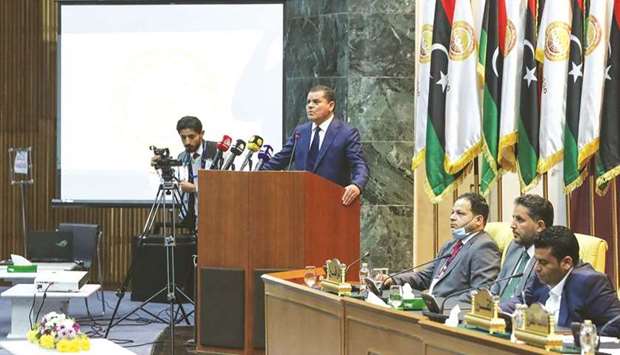Libya’s prime minister-designate demanded the departure of an estimated 20,000 foreign fighters as he sought support from lawmakers to help end a grinding civil war in the North African nation. Oil-rich Libya descended into chaos after dictator Muammar Gaddafi was toppled and killed in a 2011 Nato-backed uprising, resulting in multiple forces vying for power.
“The mercenaries are a stab in our back – they must leave,” interim premier Abdul Hamid Dbeibah told parliament, saying he would contact the United Nations and the countries where the mercenaries come from to demand they withdraw. “Our sovereignty is violated by their presence,” Dbeibah added, speaking in the central seaside city of Sirte.
Libya has been split between the UN-recognised Government of National Accord, based in the capital, and an administration in the east supported by strongman Kalifa Haftar. Dbeibah was speaking on the second day of parliamentary debate yesterday on his proposal for a new interim government, where he denounced a “fierce campaign” carried out by “those who want to destroy our country, who want to occupy it”.
A UN-supervised process aims to unite the country after an October ceasefire between the two rival administrations.
But according to the UN, some 20,000 mercenaries and foreign fighters were still in Libya in early December, and a January 23 deadline for their withdrawal passed without any sign of them pulling them out. Some have literally dug in. In January, satellite images broadcast by CNN show a trench running tens of kilometres (miles) dug by mercenaries near the front-line city of Sirte. An advance team of a UN observer mission arrived in Libya last week tasked with monitoring the ceasefire and verifying the departure of the thousands of foreign fighters.
Dbeibah, who submitted his proposed government to parliament for approval last week, pleaded for deputies to vote in favour of it. “We have no choice but to come to an agreement, for the future of our children,” Dbeibah said, to the applause of parliament.
Dbeibah was selected in February at UN-sponsored talks, attended by a cross section of Libyans, to steer the country towards December 24 elections. The process has been marred by allegations of vote-buying, but the interim premier defended the composition of his proposed government. “My first objective was to choose people with whom I would be able to work, no matter where they come from,” Dbeibah said.
The members of his government “must be able to work for all Libyans in all of Libya, not just for their region or their city”, he insisted. Over 130 of a total 188 lawmakers began meeting on Monday in Sirte, Gaddafi’s hometown, to debate the proposed cabinet. The Mediterranean port city lies halfway between Tripoli, where the western government is based, and the east, where parliament has sat in recent years and which is home to a rival administration.
The United Nations Support Mission in Libya, or UNSMIL, called the meeting “historic” and praised the convening of a “reunified session after many years of divisions and paralysis”. Dbeibah, 61, a billionaire businessman from the western town of Misrata, was selected alongside an interim three-member presidency council to head the new unity administration.

Libya’s prime minister-designate Abdul Hamid Dbeibah addresses lawmakers during the first reunited parliamentarian session, in the coastal city of Sirte east of the capital, yesterday.
